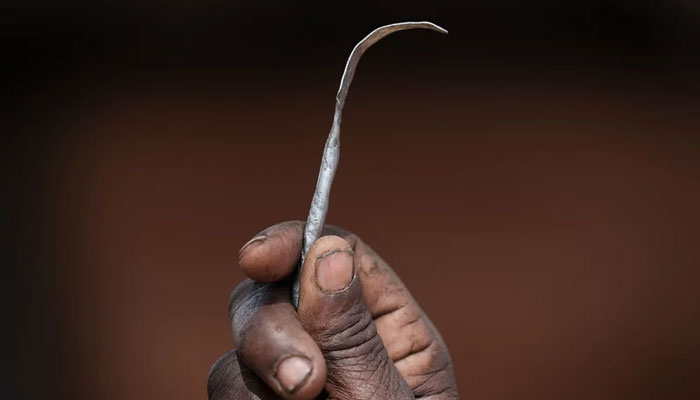Gambia MP defends bid to legalise female genital mutilation
Around 180 civil society organisations signed an open letter in October urging Gambia’s government to uphold the anti-FGM law
DAKAR: Gambian lawmaker Almaneh Gibba started his campaign to overturn a 2015 ban on female genital mutilation after the West African country imposed its first fines on those found guilty of the practice last year.
Despite concerns about the leniency of the sentences - a $220 fine for three women accused of cutting eight infant girls - anti-FGM activists welcomed the ruling as a rare victory against a culture of impunity that typically shields offenders in countries where such mutilations occur.
But the convictions also prompted a backlash among Gambia religious leaders and inspired Gibba’s push to overturn the 8-year ban on what he calls female circumcision.
Parliament is now considering a bill proposed by Gibba to the alarm of advocacy groups who say it represents a step backwards in efforts to end a practice that can cause myriad health issues.
Around 180 civil society organisations signed an open letter in October urging Gambia’s government to uphold the anti-FGM law.
It is “not just a legal imperative but a moral obligation,” Gambia’s former vice president Isatou Touray, now Gambia’s highest-profile campaigner against the practice, said in February.
“With the world watching, history will judge us based on the actions we take,” she wrote in an op-ed.
Gibba, an independent MP and government critic, told Reuters the ban was not wanted by most people in Gambia, a predominantly Muslim country where some believe cutting a part of the clitoris is required by Islam and key to a girl’s passage to womanhood.
“We will not be dictated by Western philosophy and their views on what we do,” he said. “Who are they to tell us our culture, our religion, our traditional beliefs?”
-
 Heavy Snowfall Disrupts Operations At Germany's Largest Airport
Heavy Snowfall Disrupts Operations At Germany's Largest Airport -
 Andrew Mountbatten Windsor Released Hours After Police Arrest
Andrew Mountbatten Windsor Released Hours After Police Arrest -
 Heidi Klum Eyes Spooky Season Anthem With Diplo After Being Dubbed 'Queen Of Halloween'
Heidi Klum Eyes Spooky Season Anthem With Diplo After Being Dubbed 'Queen Of Halloween' -
 King Charles Is In ‘unchartered Waters’ As Andrew Takes Family Down
King Charles Is In ‘unchartered Waters’ As Andrew Takes Family Down -
 Why Prince Harry, Meghan 'immensely' Feel 'relieved' Amid Andrew's Arrest?
Why Prince Harry, Meghan 'immensely' Feel 'relieved' Amid Andrew's Arrest? -
 Jennifer Aniston’s Boyfriend Jim Curtis Hints At Tensions At Home, Reveals Rules To Survive Fights
Jennifer Aniston’s Boyfriend Jim Curtis Hints At Tensions At Home, Reveals Rules To Survive Fights -
 Shamed Andrew ‘dismissive’ Act Towards Royal Butler Exposed
Shamed Andrew ‘dismissive’ Act Towards Royal Butler Exposed -
 Hailey Bieber Shares How She Protects Her Mental Health While Facing Endless Criticism
Hailey Bieber Shares How She Protects Her Mental Health While Facing Endless Criticism -
 Queen Elizabeth II Saw ‘qualities Of Future Queen’ In Kate Middleton
Queen Elizabeth II Saw ‘qualities Of Future Queen’ In Kate Middleton -
 Amanda Seyfried Shares Hilarious Reaction To Discovering Second Job On 'Housemaid': 'Didn’t Sign Up For That'
Amanda Seyfried Shares Hilarious Reaction To Discovering Second Job On 'Housemaid': 'Didn’t Sign Up For That' -
 Hilary Duff Reveals Deep Fear About Matthew Koma Marriage
Hilary Duff Reveals Deep Fear About Matthew Koma Marriage -
 Will Sarah Ferguson End Up In Police Questioning After Andrew’s Arrest? Barrister Answers
Will Sarah Ferguson End Up In Police Questioning After Andrew’s Arrest? Barrister Answers -
 Matthew McConaughey Gets Candid About AI Threat To Actors: 'Be Prepared'
Matthew McConaughey Gets Candid About AI Threat To Actors: 'Be Prepared' -
 Hailey Bieber Shares How 16-month-old Son Jack Blues Is Already Following In Justin Bieber's Footsteps
Hailey Bieber Shares How 16-month-old Son Jack Blues Is Already Following In Justin Bieber's Footsteps -
 Zuckerberg Denies At LA Trial That 'Instagram Targets Kids' Amid Addiction Claims
Zuckerberg Denies At LA Trial That 'Instagram Targets Kids' Amid Addiction Claims -
 France Sees Record 102mn International Tourists In 2025
France Sees Record 102mn International Tourists In 2025




